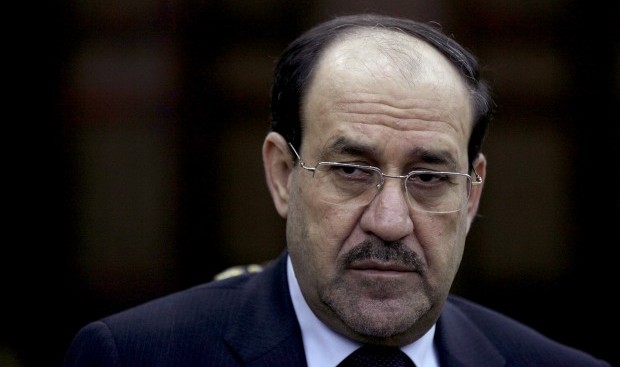
Iraq’s Prime Minister Nuri Al-Maliki in Baghdad, Iraq, on February 27, 2013. (AP Photo/Khalid Mohammed)
Baghdad, Asharq Al-Awsat—Iraqi Prime Minister Nuri Al-Maliki paid a historic visit on Saturday to Iraq’s restive Anbar province, many parts of which remain under control of the Islamic State of Iraq and Syria (ISIS).
Maliki visited the Al-Assad military base west of Ramadi, where he met with military commanders and tribal leaders to discuss the ongoing army operations in the region.
Security sources speaking to Asharq Al-Awsat on the condition of anonymity confirmed that the prime minister was briefed on military plans to deal with ISIS, including plans to retake Fallujah, which remains under control of the group.
ISIS has announced the establishment of an Islamic emirate in the province has has set up Shari’a courts, according to head of the Anbar Salvation Council Sheikh Hamid Al-Heyes.
Heyes told Asharq Al-Awsat: “Maliki’s visit received a warm welcome from the people of Anbar, who called on the prime minister to use all the resources of the state to drive ISIS and Al-Qaeda out of the region, including by helping the Anbar tribesman.”
This is the first visit the prime minister has paid to Anbar in the eighteen months since Sunni Arab demonstrators took to the streets protesting against his government’s policies.
Maliki sent the Iraqi military to dismantle protest camps in December, with protest leaders ultimately coming to an agreement to end the sit-ins in return for the army’s withdrawal.
ISIS fighters then took to the streets after the army had withdrawn, seizing control of abandoned police stations and setting up roadblocks. In response, Maliki redeployed the army to combat the Al-Qaeda-backed group.
Anbar tribesmen have been fighting on both sides of the conflict, with some supporting government troops, and others fighting against them alongside ISIS.
Responding to a question regarding the timing of Maliki’s visit, Heyes told Asharq Al-Awsat: “If Maliki had tried to visit when the protests were taking place, he would have faced the same fate as Saleh Al-Mutlaq. The protest leaders were not interested in reaching solutions at this time; they had other objectives and agendas.”
Iraqi Deputy Prime Minister Salah Al-Mutlaq famously sought to attend an Anbar rally but was forcibly expelled by protesters.
“Maliki’s visit has come at the right time, after we have exhausted all efforts. All that is required is for the government to take the required practical steps, and that is what Maliki has done.”
The Iraqi prime minister announced earlier this week that the government intends to integrate members of the Anbar tribes into the army and police force. In a statement earlier this week, Maliki said: “All residents of the province succeeded in defeating the terrorist groups and cleansing the city of Ramadi and other cities from these murderous criminals.”
Speaking at Al-Assad base, Maliki promised 10,000 jobs in the security forces for tribal fighters who have sided with the government against militants.
Iraqiya MP Qais Al-Shazar, the head of the Parliamentary Commission for Accountability and Justice, told Asharq Al-Awsat: “Maliki’s visit to Anbar and his order appointing thousands of Anbar tribesman to the security apparatus, will help to alleviate the bottleneck being suffered by the national reconciliation program, which has stumbled over the past years due to the absence of such measures.”
“This decision will go beyond this, as it will also benefit Iraq’s security and military. The Anbar tribesman know their region, and so this step will make it easier for the security apparatus to hunt the criminals there,” he added.
“This decision, and the others in this regard, will be the key to resolving the situation in the western region, but only if they are implemented on the ground.”
